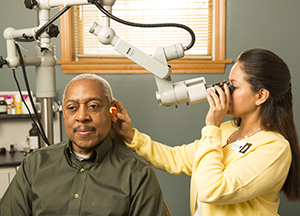A
B
C
D
E
F
G
H
I
J
K
L
M
N
O
P
Q
R
S
T
U
V
W
X
Y
Z
Topic IndexLibrary Index
Click a letter to see a list of conditions beginning with that letter.
Click 'Topic Index' to return to the index for the current topic.
Click 'Library Index' to return to the listing of all topics.
Dizziness (Vertigo) and Balance Problems: Diagnostic Tests
An otolaryngologist specializes in problems of the ear, nose, and throat. This healthcare provider is also called an ENT because of their expertise in the ears, nose, and throat. If you are having vertigo or balance problems, your primary care provider may send you to an ENT to help with a diagnosis. They'll give you an exam and go over your past health. You may need certain tests to help diagnose your problem.

Hearing testing
In most cases, you'll be sent for hearing testing. This is because the nerve that sends balance signals also sends hearing signals. A problem that affects balance can also affect hearing.
Other tests
Your ENT may advise other tests. These tests don't cause pain, but they may make you dizzy in some cases.
-
Dix-Hallpike maneuver. Your healthcare provider will gently turn your head in different angles and watch how your eyes move. This is done to determine whether you have spinning or a false impression of motion. This is a simple test your healthcare provider can do in the office to see if dizziness is caused by vertigo.
-
MRI scan. This test makes detailed images of the ear or head. A magnetic field and contrast medium are used to make the image.
-
Electronystagmography (ENG). This test records eye movement. Small electrodes are put on the skin around your eyes. Then your ear is filled with warm or cold water. This normally causes the eyes to move rapidly in one direction (nystagmus).
-
Rotation tests. Rotational chair testing provides additional information to audiologists regarding the origin of vertigo whether it is peripheral or central. For this test you sit in a chair that revolves slowly and your eye movements are recorded by special goggles that you wear. Audiologists examine your eye movements to see how they relate to your inner ear health.
-
Posturography. This tests your standing balance under different conditions. You'll stand on a platform. It measures shifts in your body weight.
-
Electrocochleography (ECoG). This test measures the fluid pressure in the inner ear. An abnormal ECoG may mean you have Meniere's disease or other health problems.
-
Vestibular evoked myogenic potentials (VEMPs). This test may be used if your ENT suspects a rare condition like superior semicircular canal dehiscence. This is a hole in the bone that covers the part of the inner ear where fluid circulates and regulates balance. For this test, electrodes are placed on your neck. You hear clicks in your ear.
-
Blood pressure and heart rate test. Your blood pressure can be taken both while you're sitting and after you stand for 2 to 3 minutes to see if there are any noticeable drops. Your heart rate may be tracked while you are upright. This is done to help determine whether your symptoms are related to a fall in blood pressure or a heart issue. This is a called syncope (fainting) or pre-syncope. It is distinct from vertigo with different causes.
Online Medical Reviewer:
Rita Sather RN
Online Medical Reviewer:
Sabrina Felson MD
Online Medical Reviewer:
Sravani Chintapalli
Date Last Reviewed:
3/1/2024
© 2000-2024 The StayWell Company, LLC. All rights reserved. This information is not intended as a substitute for professional medical care. Always follow your healthcare professional's instructions.